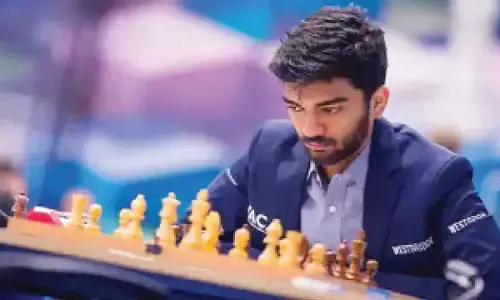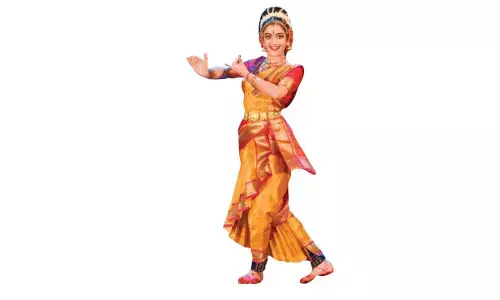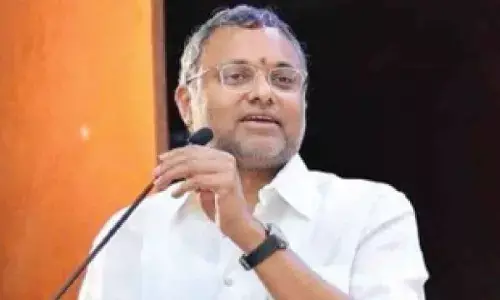Muslims in a whirlpool

Muslims in a whirlpool
In face of the unending controversies besieging the community, Indian Muslims should strive to present a united front and face these challenges proactively
In face of the unending controversies besieging the community, Indian Muslims should strive to present a united front and face these challenges proactively. It seems as if the forces inimical to the Indian Muslims have made it a strategy to challenge the community on one issue or the other in a sustained manner. Moreover, these challenges are thrown mostly when the political scenario at the central or state level is hot due to the elections.
Beginning March, the Indian Muslim community was once again besieged or confronted with one contentious issue after the other. Though the issues in question were not an existential one for the community, yet they are raised at a time when the community instead of focussing its energies on more pressing political issue gets embroiled in unnecessary controversies, thus wasting its time and energy on non-issues essentially.
The community was taken aback when news of a closed door meeting or a "Jirga- for stronger India", held on March 3 at the capital's haunt of intellectuals or powers that were or are governing the nation, broke out in the media.
As soon as the controversy started, the Muslim community and its leaders reacted in their usual fashion, and a storm of allegations and counter-allegations soon broke out on various social media platforms including Facebook and WhatsApp. The reactions also included those of non-residents Muslims, based in other countries, sharing their views and opinion on the issue.
The reaction as always seemed reactive and personality focussed. Instead of waiting for or seeking more details of the conference's organisers or those who participated and asking that why it was held behind 'closed doors' and why the organisers failed to inform the public at large about the tone and breadth of deliberations, most rose in reaction to the news shared by some news portals and some Urdu newspapers.
The news as reported was also half-baked and lacked enough homework done by those who reported it. Instead of trying to unearth the main organisers of the conference, the rationale for holding it and asking the organisers what transpired behind closed doors, and what was the need of holding such an event, they just reported some factual details and a list of participants.
Even these scanty details were enough to start a barrage of pro and anti-organisers' statements and views within the community. The discussion on social media also sprang up new surprises and soon enough on some social media platforms the members of different groups started levelling charges against one another and discussing other irrelevant issues.
The second issue relates to the so-called Muslim reformer and a well-known acolyte of the current dispensation in India. Wasim Rizvi, a Shia Muslim of Lucknow filed a writ petition in the Supreme Court asking it to delete 26 verses of the Holy Quran.
According to news reports, Rizvi in his petition has stated that the Quran, the holy book of Muslims, has "some verses that are used to promote terrorism, violence, jihad". In the PIL, Rizvi has claimed that these verses were added to the holy book of Muslims later. "These verses were added to the Quran, by the first three Caliphs, to aid the expansion of Islam by war".
Rizvi, who is a former Chairman of the Shia Waqf Board, is not new in courting controversies. Earlier, he had earned the ire of Muslims by declaring the SC verdict in the Babri Masjid demolition case as an historical one. Next he suggested that if a Muslim dies due to coronavirus, he/she should be cremated and not buried.
Later on, Rizvi urged PM Modi to scrap Places of Worship Act alleging it was introduced by Congress to "appease Muslims" He also said that temples demolished by Mughals should be rebuilt and mosques, which stand there, should be removed. Rizvi named Ram Janmabhoomi in Ayodhya, Krishna Janmabhoomi in Mathura, and Kashi Vishwanath temple in Varanasi among others as some ancient temples demolished by the Mughal rulers.
He also made some controversial movies. First was on Lord Ram and Ramjanabhoomi temple, second "Srinagar" was allegedly made to describe the plight of Kashmiri Pundits who migrated from J&K and the third one which is in making is on the second wife of the Prophet Mohammed. However, cine goers rejected all these movies and they bombed at the box office.
Sources say Rizvi might have fired the latest salvo to save his skin from a CBI inquiry, which has been ordered against Rizvi over alleged illegal sale-purchase and transfer of Waqf properties while he was chairman of the Uttar Pradesh Shia Waqf Board, based on two FIRs lodged in 2016 and 2017.
However, in Rizvi's case both Shia and Sunni clerics came at one platform very quickly. General secretary of Majlis-e-Ulama-e-Hind Maulana Kalbe Jawad and Imam of Asihbagh Eidgah, Maulana Khalid Rasheed Firangimahali condemned Rizvi for making controversial statements against the Holy Quran. Both Shia and Sunni clerics unanimously demanded that Rizvi be arrested for stoking unwarranted intra-community sentiments between Shia and Sunnis in India. Maulana Jawad also announced his excommunication from Islam.
However, in this case the reaction of the Muslim intellectuals and community leaders though reactive was not illogical. Further the case brought Shia and Sunni leaders together, condemning Rizvi for his selfish and narrow political gains and his act as an attack on Islam. As Muslims anywhere in the world can't tolerate any false propaganda against their Holy Book the Quran. And why should they?
As has been stressed umpteen times earlier, the Muslim community in India needs a proactive response mechanism, instead of a reactive one. It is passing through a phase, which will further witness, it being maligned or targeted again and again. Until and unless it is able to court to respond proactively and cohesively with support of those media outlets, which are sympathetic to it both at the central and state level, the community will not get a correct picture or version reported.
For this it needs to interact and cooperate with the independent and sympathetic media systematically, in a sustained manner and in the language, which it understands. For covering national media, it should have a pool of trained spokesmen, who should be proficient in English besides being backed by a well-researched, cohesive and fact checked response, and for the state level media it should engage people proficient in that states' language, so as to attract a larger audience.
Furthermore, it needs to be stressed that to challenge false narratives against the community and to present its correct picture, the Muslim leaders need to evolve a mechanism by which the real leaders and intellectuals of the community should be seen and willing to engage with the media in a coordinated and professional manner.
In today's world many battles have been won using social and traditional media, by adopting innovative media strategies and it is high time that Muslim leaders should also adopt those techniques but the more onerous task is to present a united image of the community, first. Further the clerics should also strive to end inner feuds and fights within the community and instil a sense of unity amongst its followers.
(Asad Mirza is a political commentator. The views Muslims in a whirlpoolexpressed are personal)

















